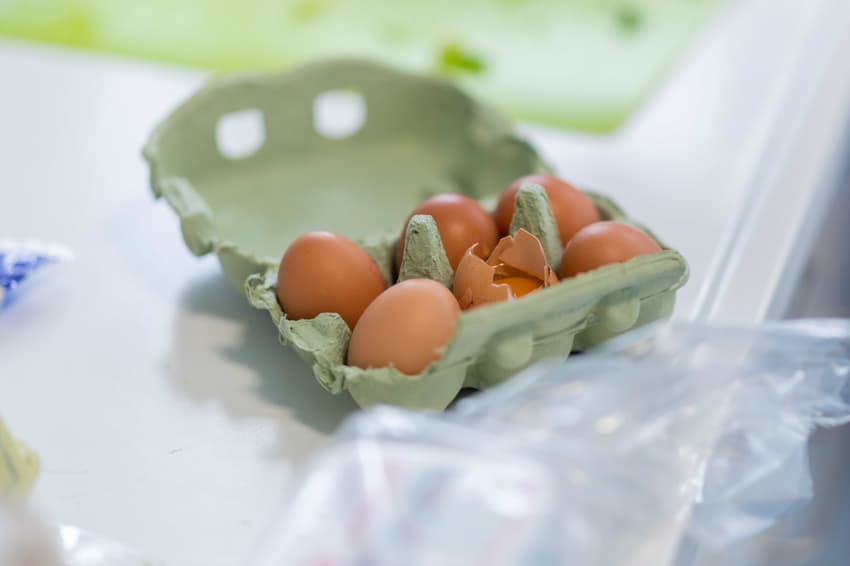Contaminated eggs found in Switzerland and across EU

Insecticide-tainted eggs from European poultry farms have now been found in Hong Kong and Switzerland as well as 15 EU countries, the European Commission said on Friday.
European Commission spokesman Daniel Rosario said all had received eggs contaminated with the pesticide fipronil, with the Commission adding that a meeting of EU ministers had been provisionally scheduled for September 26th.
"We would like this meeting to happen with some distance to the events and have as many facts established as possible," European Commission spokeswoman Mina Andreeva told a press conference.
"This is not, let's be clear, a crisis meeting," Andreeva said.
The EU countries affected are Belgium, the Netherlands, Germany, France, Sweden, Britain, Austria, Ireland, Italy, Luxembourg, Poland, Romania, Slovakia, Slovenia and Denmark, along with non-EU Switzerland, and Hong Kong, Rosario said.
Farms had been shut down in four countries -- Belgium, Netherlands, Germany and France -- where authorities have confirmed the illegal use of the substance to treat poultry farms, he added.
The other countries -- plus non-EU Switzerland and Hong Kong -- received exports from the four countries.
Millions of eggs and egg-based products have been pulled from European supermarket shelves since the scare went public on August 1st and there are growing questions about who knew what, and when.
Fipronil is commonly used to get rid of fleas, lice and ticks from animals but is banned by the European Union from use in the food industry.
The World Health Organization (WHO) says that when eaten in large quantities it can harm people's kidneys, liver and thyroid glands.
Last weekend Swiss supermarkets said they had removed eggs from their shelves, however the authorities who approved the recall urged people not to panic.
"The quantities observed so far do not endanger the health of consumers," said the Swiss Food Safety Authority (OSAV).
Losses are expected to run into millions of euros.
Comments
See Also
European Commission spokesman Daniel Rosario said all had received eggs contaminated with the pesticide fipronil, with the Commission adding that a meeting of EU ministers had been provisionally scheduled for September 26th.
"We would like this meeting to happen with some distance to the events and have as many facts established as possible," European Commission spokeswoman Mina Andreeva told a press conference.
"This is not, let's be clear, a crisis meeting," Andreeva said.
The EU countries affected are Belgium, the Netherlands, Germany, France, Sweden, Britain, Austria, Ireland, Italy, Luxembourg, Poland, Romania, Slovakia, Slovenia and Denmark, along with non-EU Switzerland, and Hong Kong, Rosario said.
Farms had been shut down in four countries -- Belgium, Netherlands, Germany and France -- where authorities have confirmed the illegal use of the substance to treat poultry farms, he added.
The other countries -- plus non-EU Switzerland and Hong Kong -- received exports from the four countries.
Millions of eggs and egg-based products have been pulled from European supermarket shelves since the scare went public on August 1st and there are growing questions about who knew what, and when.
Fipronil is commonly used to get rid of fleas, lice and ticks from animals but is banned by the European Union from use in the food industry.
The World Health Organization (WHO) says that when eaten in large quantities it can harm people's kidneys, liver and thyroid glands.
Last weekend Swiss supermarkets said they had removed eggs from their shelves, however the authorities who approved the recall urged people not to panic.
"The quantities observed so far do not endanger the health of consumers," said the Swiss Food Safety Authority (OSAV).
Losses are expected to run into millions of euros.
Join the conversation in our comments section below. Share your own views and experience and if you have a question or suggestion for our journalists then email us at [email protected].
Please keep comments civil, constructive and on topic – and make sure to read our terms of use before getting involved.
Please log in here to leave a comment.